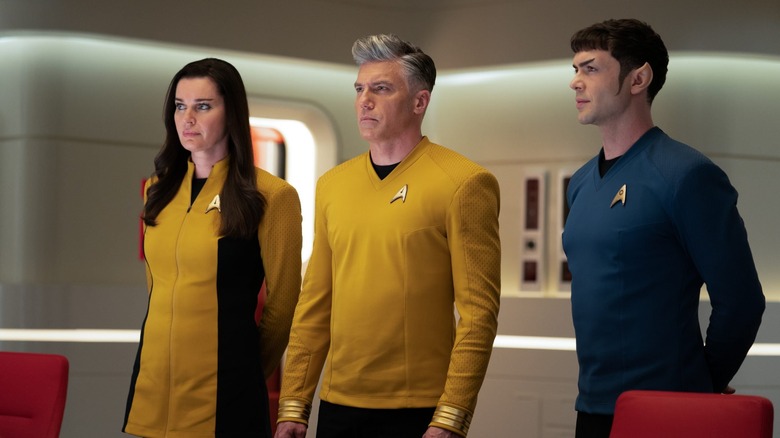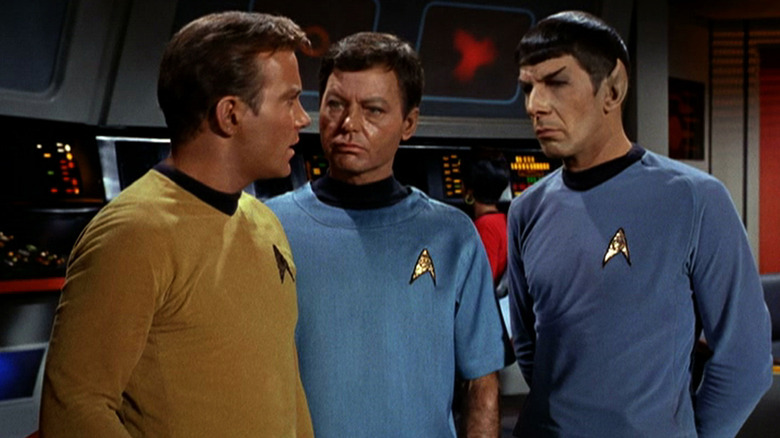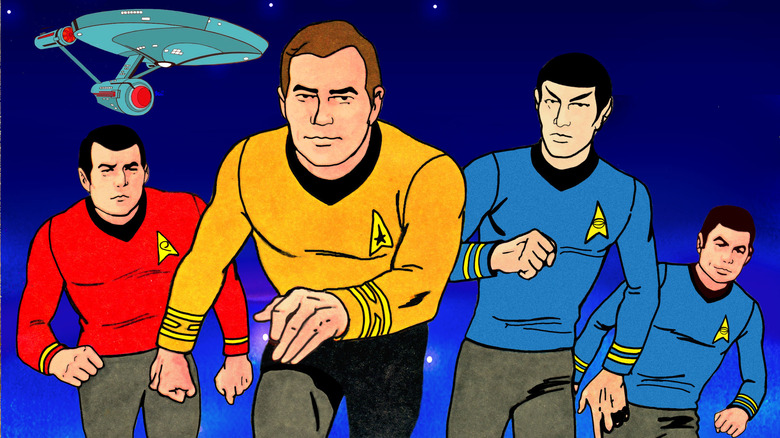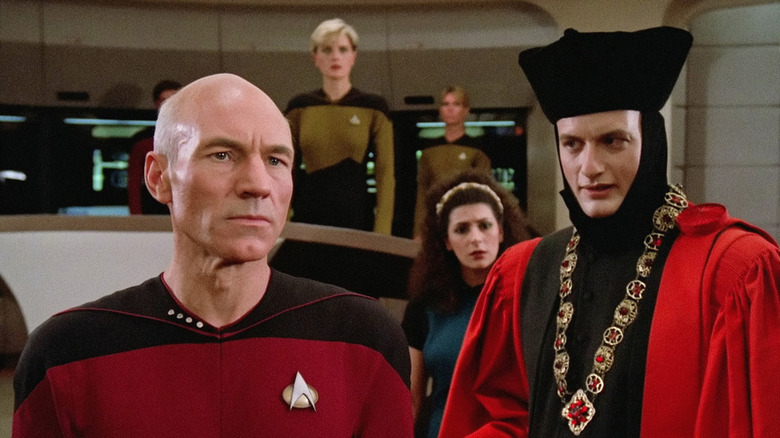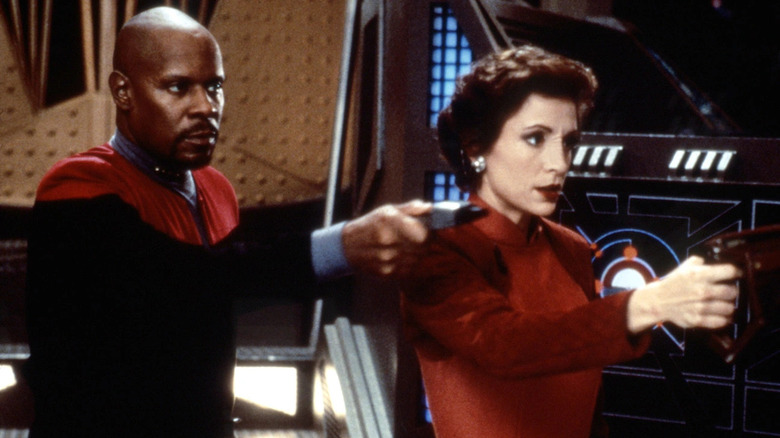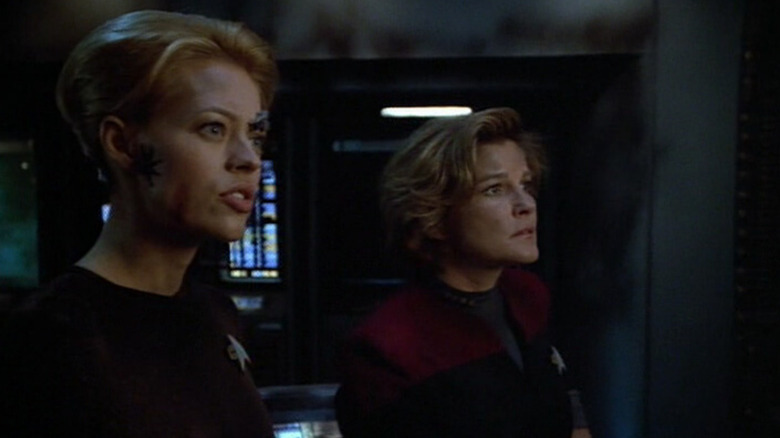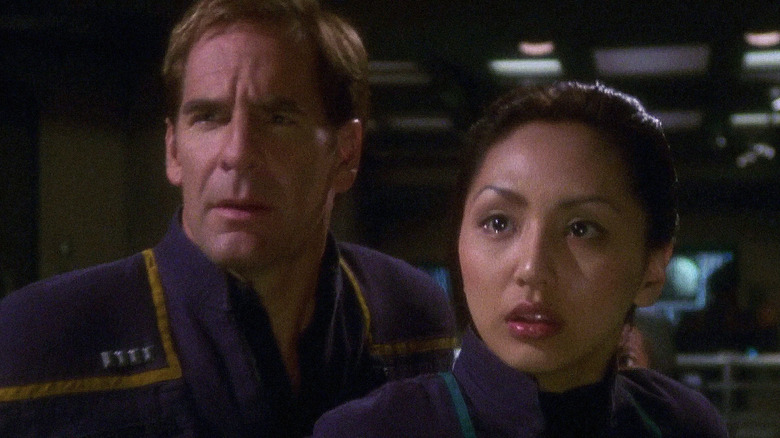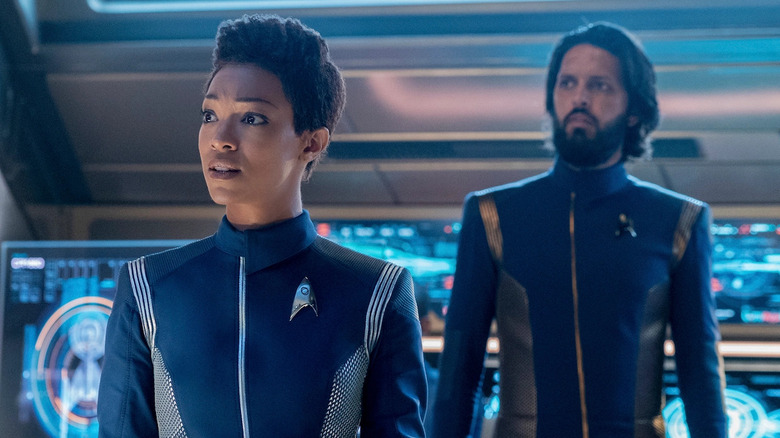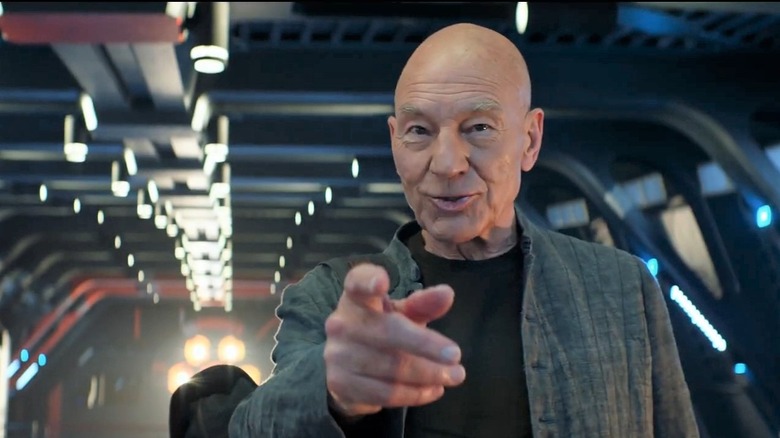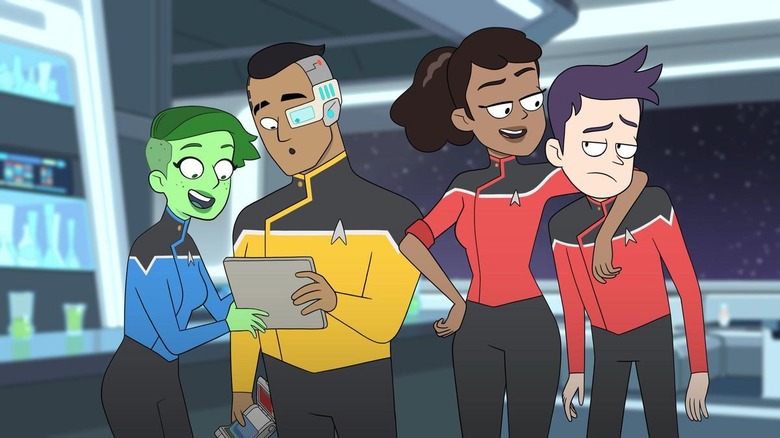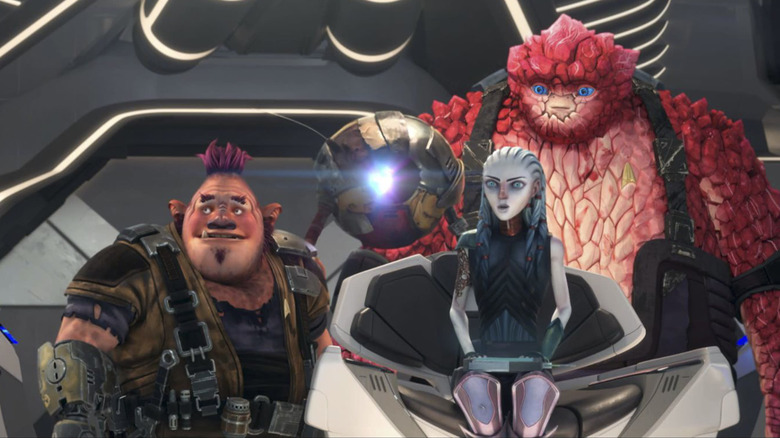A Guide To Which Star Trek Show To Watch Next If You Loved Strange New Worlds
I have spent the past few months fielding emails and messages from friends, family members, and acquaintances, all asking the same burning question: "Hey, I started watching 'Star Trek: Strange New Worlds' and I love it. What 'Star Trek' show should I watch next?"
The beauty of "Star Trek: Strange New Worlds" is that it's simultaneously a gift for longtime fans (so many deep cut references and canonical explanations!) and a treat for total newcomers (an instantly likable cast and compelling standalone storytelling!). When I spoke to co-showrunner Henry Alonso Myers, he talked about building the ideal "Star Trek" show, one that picks and chooses everything that worked across the many shows in the franchise and combining them into a series that will appeal to fans of all backgrounds and tastes. They succeeded. Old fans are happy, and new fans want to know where to go next.
That's where this article comes in.
From the outside looking in, getting into "Star Trek" appears daunting. There are a lot of shows, and decades of history to contend with. Every fan has that show they love and that show they ... don't love. Some shows are instantly accessible, and others should be saved for later. The good news is that once you wade into the deep end, "Star Trek" is the gift that keeps on giving. Once the hooks are in you, they're in for life — and you'll have hundreds and hundreds of hours of television to obsess over in the years to come.
So here we go. Strap in. Engage. Hit it. If you're a new fan looking for what to watch next while you wait for "Strange New Worlds" season 2, we've got you.
Star Trek: The Original Series
The Basic Gist: Yep, here's the show that started it all. While startlingly progressive for its time, "Star Trek: The Original Series" can feel a little creaky by modern standards — after all, for all of its utopian ideals, this is still a show largely made by white men in the 1960s. However, the show has aged better than you'd expect. The masterful episodes ("Balance of Terror," "Amok Time," "The City on the Edge of Forever") still work like gangbusters, and at the lesser episodes have a kitsch value that cannot be denied. By and large, "Star Trek" is a smart, weird, funny science fiction show that simply asks you to meet it halfway. If you're able to deal with the show's slower pace and old-school special effects, you'll find a series deeply committed to asking big questions, and answering them with a cast of characters who have endured for a reason. William Shatner, Leonard Nimoy, and DeForrest Kelly truly set the standard for a "Trek" family, and they carry even the worst episodes (Nimoy, in particular, gives one of the finest performances in pop culture history as the original Spock).
Should It Be Your Next Trek: If you want to do things by in-universe chronology, yes! "Star Trek" is set on the same Enterprise as "Strange New Worlds" and features many of the same characters ... just seven years in the future of the show's universe, but produced nearly 60 years ago in our world. Because you already know this ship, and know these characters, it makes for an easy transition, especially with the tastefully remastered episodes streaming on Paramount+. Just be prepared for a show made for a different generation and you'll be surprised by how little it feels like homework.
Star Trek: The Animated Series
The Basic Gist: Following the cancelation of "Star Trek" in 1969, the series became a smash hit in syndication. With an army of newfound fans clamoring for more (and the first movie half a decade away), "Star Trek: The Animated Series" arrived in 1974 to quench that Trekkie thirst. Spearheaded by some of the original show's best writers and featuring the return of the core cast, it's essentially a fourth season of the classic series, but featuring plots, aliens, and planets that could not be accomplished in live-action.
Should It Be Your Next Trek: Nope. Although not a bad show by any stretch of the imagination, the low-budget animation and dated production values are tough to stomach these days. There's neat stuff here, and some really interesting episodes and concepts, but this is what you watch after you've run out of the other "Star Trek" and need another fix.
Star Trek: The Next Generation
The Basic Gist: Nearly 20 years after the cancelation of the original series, "Star Trek: The Next Generation" arrived to kickstart the franchise for a new era. Set many years after the adventures of Captain Kirk and Spock, the show follows Captain Picard and the crew of a new Enterprise as they explore the galaxy, deal with space diplomacy, and engage in battle (but only when talking it out fails). "The Next Generation" is a different flavor from the original series, generally eschewing the two-fisted pulp of Kirk's adventures for a show that feels like a science fiction answer to "Law and Order" and "E.R." — a workplace drama about people who are good at their jobs. There's a comfiness to this show you don't find in other "Trek" shows, a focus on professionals doing their best in an environment where they're allowed to excel. Sure, there are big battles and amazing character moments (Patrick Stewart's Picard is a legend for a reason), but this is ideal comfort food TV.
Should It Be Your Next Trek: Probably! Most "Trek" fans agree that the first two seasons of "The Next Generation" are hit-and-miss, with a few standout episodes (like season 2's "The Measure of a Man") sparkling amidst tired, outdated, corny storytelling. However, the show finds its footing in season 3 and remains dependable (and often incredible) until its pitch-perfect series finale. Some will encourage you to skip right to season 3, since the show's episodic structure means you won't miss much, plot-wise. However, I say that part of being a "Trek" fan is being a completist. Endure the first two seasons (make them a laundry-folding activity!) and let them set the stage for the greater rewards in season 3 and beyond. Plus, the high-definition remastering is stunning — the show looks like it was filmed this year.
Star Trek: Deep Space Nine
The Basic Gist: Although derided by many fans upon its debut, "Star Trek: Deep Space Nine" has aged into perhaps the greatest of all "Trek" shows. Rather than simply continue the messaging and tone of the optimistic and hopeful "Star Trek: The Next Generation," "Deep Space Nine" looks inward and serves as a necessary interrogation of the entire "Star Trek" universe and its ideals. Characters are stuck on a space station, and have to literally live alongside the people whose lives they change (no escaping away to another planet between episodes!). Massive conflicts, so carefully avoided in previous shows, prove inevitable as the Federation's ideals buckle under powerful external forces. The crew of the titular space station — messy, broken, ordinary people thrust into extraordinary situations — couldn't be more different from the calm and collected A-students of "The Next Generation." This is "Star Trek" at its darkest, its most reflective, and also its most wry. "Deep Space Nine" wants to examine, with brutal and often hilarious honesty, everything you have ever known about the franchise.
Should It Be Your Next Trek: Yes and no. It's a great show, but also one that benefits from having seen enough other "Star Trek" entries to appreciate how it dissects and explores the franchise's larger vision. Still, with its beautifully screwed-up characters and long-form story arcs, "Deep Space Nine" feels profoundly modern for a '90s TV series, and viewers weaned on Peak TV will find many early seeds of the television revolution planted here. Even without outside knowledge, this is a great show, and one every burgeoning "Trek" fan needs to see at some point. The minor downsides include a hit-and-miss first season (the norm for most "Trek" shows) and the lack of a high-definition remaster — watching "Deep Space Nine" today is like watching it through a mud filter.
Star Trek: Voyager
The Basic Gist: How would a Starship crew function if they were warped across the galaxy by an alien being, and forced to begin the years-long journey home with no outside assistance, no back-up, and no promise of a safe port? That's the compelling set-up for "Star Trek: Voyager," which leans hard into classical "Star Trek" trappings despite its grim premise. Noteworthy for featuring the franchise's first female Captain in a lead role (Kate Mulgrew's Kathryn Janeway), "Voyager" strives for a real "The Next Generation" energy with its largely one-off adventures and ability to shift between tones at the drop of a hat. Depending on the age of the "Trek" fan, "Voyager" could be the comfort food series they grew up with instead of "The Next Generation."
Should It Be Your Next Trek: Yes. It's standalone "Star Trek" that requires little knowledge of the wider franchise and begins with a fairly clean slate. But here's where my biases show — I am not a "Voyager" fan and cannot recommend this scattershot series as the next step for a new "Star Trek" viewer. Its crew is never as wholly compelling as others, its storytelling is rarely as assured, and it often fails to truly engage with or confront the drama inherent in its premise. However, countless other fans are out there to say I'm wrong and express their love for it, so your mileage may vary. The big thing it has going for it is that any viewer, even those brand new to the franchise, can jump right in and follow it just fine. And that may be enough.
Star Trek: Enterprise
The Basic Gist: What happened in the years immediately following humanity's first contact with alien life? What was it like to be a newbie in the United Federation of Planets? How did Starfleet come to be, and what was it like to explore the galaxy without transporters, proper starship shields, and many of the other nifty gizmos and technologies other "Star Trek" shows take for granted? "Star Trek: Enterprise" is here to answer those questions. It's a prequel series that exists to fill in lots of canonical gaps, whether they deserve to be filled in or not. And, of course, there's that infamous theme song, which was widely derided upon premiere but now has a lovely, slightly ironic following.
Should It Be Your Next Trek: Probably not! "Enterprise" is a pretty good show that really starts to gel in its third season before its abrupt cancelation after season 4. You can surely jump in and enjoy it just fine as newcomer, but there are more satisfying Treks to be found mainly because ... well, those other ones have endings. And the series finale here is widely regarded as one of the worst episodes of the entire franchise. Plus, many of the questions "Enterprise" exists to answer will only prove interesting to a seasoned fan. In other words: Come to this one when you're a bit more seasoned, and come prepared knowing it's a bit scattershot.
Star Trek: Discovery
The Basic Gist: A sequel to "Enterprise" and a prequel to "The Original Series," "Star Trek: Discovery" takes place a decade before Captain James T. Kirk commanded the Enterprise. As the first modern streaming "Trek" series, it has a lot of what you'd expect from a modern television show: Heavily episodic storytelling, slick production values, a wonderfully diverse cast, and even some harsh language (which feels wholly unnecessary, to be frank). Although controversial among "Star Trek" fans (for reasons both reasonable and unreasonable), "Discovery" was the franchise's return to the small screen after years of exile, boosted by the big screen success of the reboot movies. It's ambitious, messy, chaotic, and, at its best, very entertaining. However, it's the rare "Star Trek" show that feels like its spinning its wheels a little too often. In other words, it's a modern streaming series through and through.
Should It Be Your Next Trek: Despite the mixed reception to "Discovery," the answer here is a pretty clear yes. "Star Trek: Strange New Worlds" may stand alone, but it is a direct spin-off from "Discovery," as Anson Mount's Captain Pike, Ethan Peck's Spock, and Rebecca Romijn's Number One all debuted as guest stars during the show's second season. If you want to see more of them, and you want to stick with a "Trek" that looks shiny and expensive, this is a natural place to head next. Just know that the one-off adventures that make "Strange New Worlds" so appealing are not present here — these are season-long arcs, for better and worse.
Star Trek: Picard
The Basic Gist: Set decades after the conclusion of "Star Trek: The Next Generation" (and the final "Next Gen" movie, "Star Trek: Nemesis"), "Star Trek: Picard" finds Patrick Stewart's noble captain living in exile at his family vineyard, estranged from Starfleet following a humanitarian disaster that broke his faith in everything he held dear. It's startling to see Picard down and out, and it's perhaps the series' boldest, most effective choice, as it makes the inevitable call-to-action that follows all the more enticing. Like "Discovery," "Picard" is a bit of a mess, and its "season-long-movie" serialized storytelling style is often frustrating, but there's no denying the joy that comes with seeing Stewart back in this role. The emotional beats, including tidying up a few messy loose-ends from the "Next Generation" era, make up for the sluggish and sometimes baffling storytelling.
Should It Be Your Next Trek: Absolutely not. "Picard" is a show for folks who already have a strong attachment to Jean-Luc Picard, and know his history, relationships, and past adventures. Sure, you could jump in, but the show is inconsistent enough to drive a lot of newcomers away. Save this one for down the road, when you'll have the necessary affection for Picard to help you power through the rough patches.
Star Trek: Lower Decks
The Basic Gist: Every "Star Trek" show follows the bridge crew — the captain, the first officer, the head of medical, the chief engineer, etc. The best of the best. The elite. Those with the fortitude, grit, and intelligence to lead a crew through dangers great and small. But not everyone on a starship can be an overachiever, and not everyone gets one of those coveted bridge seats. Someone has to fix the broken machines, swab the holodeck, catalogue cargo holds, and generally get their hands dirty. "Star Trek: Lower Decks," a hilarious and generally brilliant animated series, follows just those people. Set during the tail-end of the "Next Generation" era, "Lower Decks" tells half-hour comedic stories about the ensigns who work the jobs no one talks about on a starship that never gets particularly interesting assignments, and the various hijinks that ensue. And while the show is very funny, its heart is always in the right place — "Star Trek" itself is never mocked, even as the various elements that define it are roasted over the coals.
Should It Be Your Next Trek: Yep! Each episode of "Lower Decks" has dozens of tiny jokes, visual references, and asides that exist to make seasoned fans pause so they can try to explain the reference to their friends and loved ones (sorry, friends and loved ones), but the characters, main stories, and most forward-facing jokes require only basic knowledge of the "Trek" universe. It's a tricky balancing act, and one that the show would do well to keep up — those 22-minute running times make this a very approachable show for newcomers.
Star Trek: Prodigy
The Basic Gist: The first 3D animated "Star Trek" show and the first made specifically with a young audience in mind, "Star Trek: Prodigy" follows a group of young aliens who find an abandoned starship and use it to escape the desolate prison colony they call home. Guided by a holographic version of Captain Janeway from "Star Trek: Voyager," they must learn to work together to survive, going from ragtag crew of misfits to something resembling a proper Starfleet crew.
Should It Be Your Next Trek: If you're an adult, probably not. Or rather, it probably won't be your priority. But you're not the target audience for "Prodigy." If you watched "Strange New Worlds" with your family and you have kids itching to watch some modern "Star Trek" that is made for them, this is the way to go. "Prodigy" is "Trek" for kids raised on various "Star Wars" animated shows, and it shows. However, this is a perfect gateway to transform young burgeoning fans into Trekkies for life. It's doing the good work.
